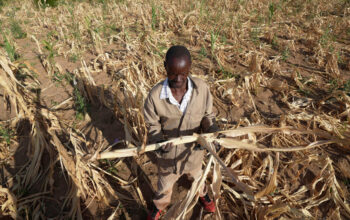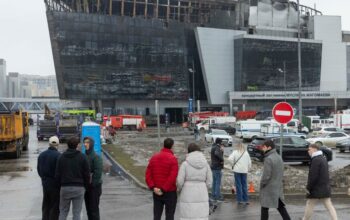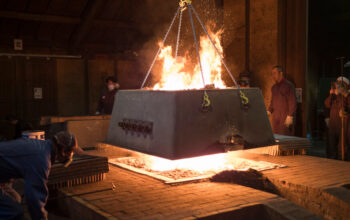
KYIV, Ukraine — With fears mounting of war in Europe, President Biden prepared to gather NATO allies by phone on Friday to discuss the threat to Ukraine, and President Vladimir V. Putin of Russia planned to preside over military drills on Saturday that will feature some of the nation’s most powerful weapons.
Mr. Biden’s urgent diplomacy and Mr. Putin’s show of strength illustrated the spiraling tensions between Russia and the West, which threaten to spill into all-out conflict. Fighting escalated on Thursday along a volatile front line between Ukrainian forces and Russia-backed separatists in eastern Ukraine, the type of situation that the Biden administration says Moscow could use as a pretext to launch a wider invasion.
The Biden administration has said it believes Russia is poised to invade Ukraine within days. Although Moscow insists that it has no such plans, it has vowed to mount “a tough response” if the United States and its NATO partners do not roll back their presence in Eastern Europe.
In a demonstration of strength, Russia will conduct major drills this weekend that will include the launch of ballistic and cruise missiles, the country’s defense ministry said, according to the Interfax news agency.
The Russian drills will involve Russia’s Black Sea Fleet, which has been engaged in large-scale exercises in the region bordering Ukraine. Mr. Putin will take part, the Kremlin said, presiding over them from a “situation center.”
Although the drills were planned in advance and Dmitri S. Peskov, the Kremlin’s spokesman, denied that they were intended to raise tensions, they come at a critical juncture in the standoff over Ukraine.
President Biden’s defense secretary, Lloyd J. Austin III, on Friday repeated U.S. warnings that more than 150,000 Russian troops arrayed near Ukraine’s borders were preparing to launch a major attack.
“Although Russia has announced that it is moving its forces back to garrisons, we have yet to see that,” he said at a news conference on Friday alongside his Polish counterpart in Warsaw. “In fact, we see more forces moving into that border region.”

Russian or Russian-
backed military
positions as of Feb. 13
Stanytsia Luhanska
Approximate line
separating Ukrainian
and Russian-backed
separatist forces.
Rostov-on-Don
SEA OF
AZOV
Sevastopol

Russian or Russian-backed
military positions as of Feb. 13
Stanytsia Luhanska
Kryvyi Rih
Approximate line
separating Ukrainian
and Russian-backed
separatist forces.
Sevastopol
As high-level diplomacy continues to compete with the military maneuvering, an uneasy calm settled over eastern Ukraine early Friday after a night punctuated by explosions and bursts of gunfire in as many as 30 villages and towns along a 250-mile stretch of land separating Ukrainian and Russia-backed forces. Although periodic exchanges of gunfire are not uncommon in the grinding, eight-year trench war, that violence was of a heightened scale.
As the events play out, officials in Russia, the United States and in Ukraine are trying to shape the narrative.
U.S. officials said they were “watching closely” out of concern that Russia could use violence in eastern Ukraine as a pretext to invade Ukraine. Secretary of State Antony J. Blinken told the United Nations Security Council on Thursday that Russia planned to “manufacture a pretext for its attack,” possibly with a “so-called terrorist bombing” or “a fake, even a real attack” with chemical weapons.
Residents in areas controlled by Ukraine’s government have been stocking up on food and other supplies, and the country’s defense minister, Oleksiy Reznikov, on Friday sought to reassure people living in the territory held by Russia-backed separatists that they faced no threat from government forces.
He told Ukraine’s Parliament that he had traveled across the region, urging people not to believe Russian propaganda that the Ukrainian government was going to attack them. His message, he said, was “Don’t be afraid” and “Ukraine is not your enemy.”
Russia has blamed Kyiv for the escalation of violence in eastern Ukraine, and the Kremlin spokesman, Dmitri S. Peskov, on Friday described recent events there as “very worrying news.”
“It is potentially very dangerous,” he said.



